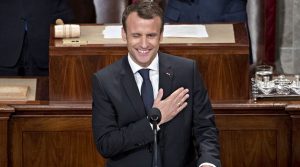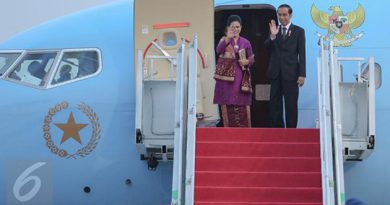Macron Says He Thinks Trump Will Pull Out of Iran Nuclear Deal

French President Emmanuel Macron said he thinks U.S. President Donald Trump will withdraw from the Iran nuclear accord, dealing a blow to the six-nation agreement reached in 2015 and endorsed by world powers.
“My view — I don’t know what your president will decide — is that he will get rid of this deal on his own for domestic reasons,” Macron told journalists Wednesday in Washington, adding that he encouraged the American president to stay in the accord during his three-day visit to the U.S. capital.
“You will have probably, it’s almost sure, a period of tension in such a scenario,” he said. “We have to accept that because there is no other option, and it’s the bet of your president that this period of tension could be fruitful because it could push them to move.”
Macron later said he had “no insider” information on Trump’s decision regarding the future of the nuclear agreement, which continues to be endorsed by the United Nations and supported by all the other parties to it.
Oil prices were little changed in the wake of Macron’s remarks.
Macron spoke a day after he and Trump hosted a news conference in which the French president proposed a new agreement which would try to address many of Trump’s concerns about the six-party accord, which he has called “insane” and the “worst deal ever.” Keeping the U.S. in the agreement reached during the Obama administration has been a priority for Macron and European leaders ahead of a May 12 deadline for Trump to continue to waive American sanctions that were lifted as part of the deal.
That deadline means there’s still time for Trump to decide to stay in the accord for now. German Chancellor Angela Merkel will be in Washington Friday and will reiterate Macron’s message about staying in the accord. But two of the president’s key foreign policy advisers — new National Security Adviser John Bolton and his nominee for secretary of state, Mike Pompeo — have both long opposed the agreement as contrary to American interests.
Though his suggestion of a new, separate agreement appeared to surprise Macron’s own European allies, Trump seemed at least somewhat interested in the French president’s blueprint, calling it a “new deal” with “solid foundations.” Teams of American negotiators have been working with European allies for weeks on a new accord. Like Macron, their biggest challenge is the absence of any guarantee that Trump will accept the result.
But any desire Trump had for the French proposal — and the close relationship he has established with Macron — didn’t appear to overcome his steadfast opposition to the existing agreement.
Campaign Vow
Iran negotiated the agreement — providing for curbs on its nuclear program in return for relief from many of the sanctions weighing on its economy — with China, France, Russia, Germany, the U.K. and the U.S. in 2015. Regular assessments by the International Atomic Energy Agency since the deal took effect have found Iran in full compliance with its obligations.
But that argument has never persuaded Trump, who has sought tougher penalties on Iran’s ballistic missile program and Tehran’s role in the Middle East.
At points during his campaign for the presidency in 2016, Trump had vowed to tear up the agreement on his first day in office. While that didn’t happen, the 90-day deadlines for him to continue waiving sanctions — built into a law passed by Congress — have forced the issue onto his desk at regular intervals, adding to uncertainty over its future.
‘Insane’ and ‘Ridiculous’
Within minutes of the two leaders sitting down in the Oval Office on Tuesday, Trump ridiculed the existing agreement as “terrible,” “insane,” and “ridiculous.” Trump went on to threaten Iran with “a price like few countries have ever paid” if the Tehran government restarted their nuclear program in response to an American withdrawal from the accord.
Some analysts thought that the upcoming talks with North Korean leader Kim Jong Un might be weighing heavily on Trump — and leave him more inclined to preserve the agreement. A U.S. withdrawal could undermine American credibility at the negotiating table as it seeks denuclearization in another hot zone.
Iranian Foreign Minister Mohammad Javad Zarif earlier this week noted the impending Korean talks and warned in an interview that Trump was signaling that the U.S. is “not a trustworthy, reliable negotiating partner.” Zarif repeated a warning that Iran would no longer be bound by the deal’s limits if America withdrew.
“If the United States were to withdraw from the nuclear deal, the immediate consequence in all likelihood would be that Iran would reciprocate and withdraw,” Zarif told the Associated Press.
Courtesy : Bloomberg
[social_warfare buttons=”Facebook,Pinterest,LinkedIn,Twitter,Total”]



